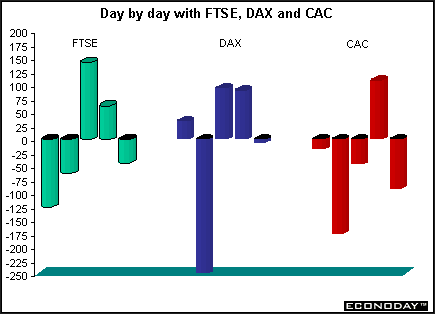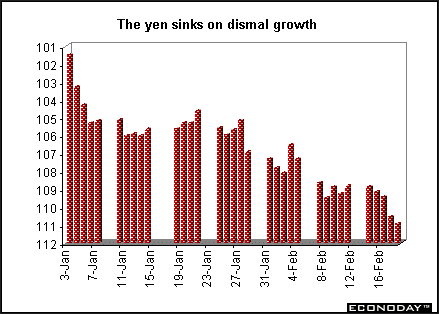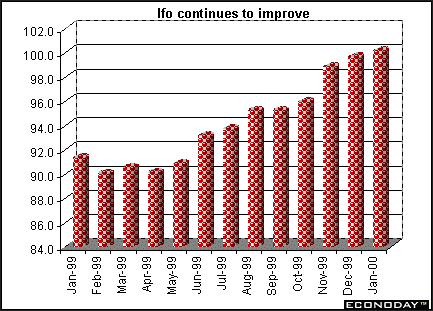| Previous Articles |
|
Something
all markets have in common - volatility
Profit
taking and interest rates rattle Europe
The FTSE 100 fell below the 6,000 level for the first time in almost four months as interest rate fears continue to undermine market sentiment. The index has dropped almost 14 percent from a record high of 6,950.6 on December 30, with fund managers deserting traditional blue chip shares in banking and oil. The FTSE slipped 28 points or 0.5 percent to end the week at 6165. Analysts said that there is overwhelming anxiety about interest rates and said the markets will remain very sensitive to any evidence on the speed and magnitude of rate hikes. U.S. markets are shut on Monday for President's Day while in the United Kingdom most schools are closed for a half-term holiday. The Paris CAC was the big loser in Europe, dropping 224 points or 3.6 percent to end the week at 6063. The DAX lost 38 points or 0.5 percent to close the week at 7574. A difficult
market week in Asia Hong Kong Hang Seng index was lower amid worries over the U.S. interest rate outlook. Analysts noted that blue chips were hurt by profit taking following record highs the previous week, as investors sought cash for forthcoming IPOs on the Growth Enterprise Market. The Hong Kong Hang Seng lost 382.07 points or 2.3 per cent to close a very volatile week at 16,599.16.
The
TSE - Americas' star performer
The
yen drops, the euro struggles In his testimony, Greenspan signaled that the central bank would continue raising interest rates to ensure that the economy's record expansion does not spark faster inflation. Higher rates would make U.S. deposits and bond yields more attractive to Japanese and European investors. Ten year Treasuries yield about 4.7 percentage points more than Japanese government debt of comparable maturity and almost a full point more than German government debt. Benchmark interest rates in Japan are expected to remain near zero while those in Europe stand at 3.25 percent. The yen sank against all 17 primary currencies this week. It was hurt as Moody's Investors Service warned Thursday it may lower the ``Aa1'' rating assigned to securities issued and guaranteed by the Japanese government.
Although the euro recovered some of its loses against the dollar when U.S. stocks plummeted Friday, it still ended the week lower. Some traders were looking to lock in gains ahead of the long U.S. holiday weekend. Financial markets will be shut in the United States on Monday, but Europe and Japan will be open.
The euro's decline combined with faster economic growth have raised the risk that inflation will accelerate. This could prompt the European Central Bank to increase interest rates to cool the economy. On Friday, the euro briefly rose to a one-week high of 99.58 U.S. cents on a report showing higher-than-expected business confidence in Germany. Although reports are pointing to better prospects in Euroland, the economic fundamentals in the United States are so strong that the euro has a tough time holding onto any gains. Indicator
Scoreboard The January retail price index excluding mortgages (RPIX) fell 0.4 percent and inched down to 2.1 percent when compared with last year. The decline was due to lower food and tobacco prices rather than a decline in the core parts of the index. The all items retail price index (RPI) also fell 0.4 percent in January but was up 2 percent when compared with a year ago.
January retail sales jumped 1.5 percent in sales volume and rose 6.1 percent when compared with last year. The non-food sector exhibited particularly strong growth with sales rising by 3.6 percent. Within this, household goods jumped 7.3 percent on the month while clothing and footwear grew by 1.8 percent. Non-specialized stores such as department stores rose 1.0 percent. Other stores in the non-food category rose by 3.7 percent on the month.
February claimant unemployment stayed at 4.6 percent, down 0.3 percentage points when compared with a year ago. This is the lowest level since January 1980. December average earnings soared 6.2 percent when compared with last year. This is the largest increase since March 1992. Most of the increase was concentrated in bonuses and was spread across both manufacturing and financial services.
Germany - The January west German Ifo index rose to 100.1 from 99.6 in December. This was stronger than analysts' were expecting. The current conditions component remained at 91.2 while the business expectations component registered a healthy increase from 108.2 to 109.4.The east German index slipped from 105.3 to 104.9.
January wholesale prices rose 0.6 percent and 4 percent when compared with a year ago. Once again, oil product prices provided the upward momentum and rose 44.7 percent when compared with last year. December pan-German domestic and foreign manufacturing orders were revised down sharply, but must be interpreted with caution since they may just signal a correction from the strong increase the previous two months. Domestic orders were down 2.2 percent on the month while foreign orders fell 4.0 percent. The Bundesbank noted that the orders figures for October and November were boosted by bulk orders that somewhat exaggerated the actual trend in the economy. Americas
In December imports increased at a faster pace than exports, reducing the monthly trade balance to C$2.7 billion, compared with a revised C$3.2 billion in November. Exports rose 1.4 percent primarily the result of robust sales of trucks, automobiles, plastics and crude oil to the United States, as well as forestry product exports to Asia. Imports jumped 3.2 percent with all sectors except energy, which remained unchanged, increasing. The 1999 annual trade balance with the rest of the world reached almost C$34 billion, its highest level since 1996, as exports during the year grew at almost twice the pace of imports. For 1999 as a whole, Canada exports were up 11.9 percent from the previous year while imports rose 7.7 percent. BOTTOM LINE
In Asia, the Japanese
economy continues to disappoint although the Nikkei is hovering just
below the important benchmark of 20,000. With the approaching end of
Japan's fiscal year on March 31st, investors will be shifting portfolios
for the best possible results. While inflows of foreign investment money
had boosted the yen's value - as well as the Nikkei's - the disappointing
news of weak consumer spending and possibly negative fourth-quarter
gross national product are eroding the yen's strength. This is much
to the delight of exporters who need to repatriate foreign earnings
before the end of the fiscal year.
Release dates are subject to change. For U.S. data releases, see this week's Simply Economics. |
||||||||||||||||||||||||||||||||||||||||||||||||||||||||||||||||||||||||||||||||||||||||||||||||||||||||||||||||||||||||||||||||||||||||||||||||||||||||||||||||||||||||||||||||||||||||||








